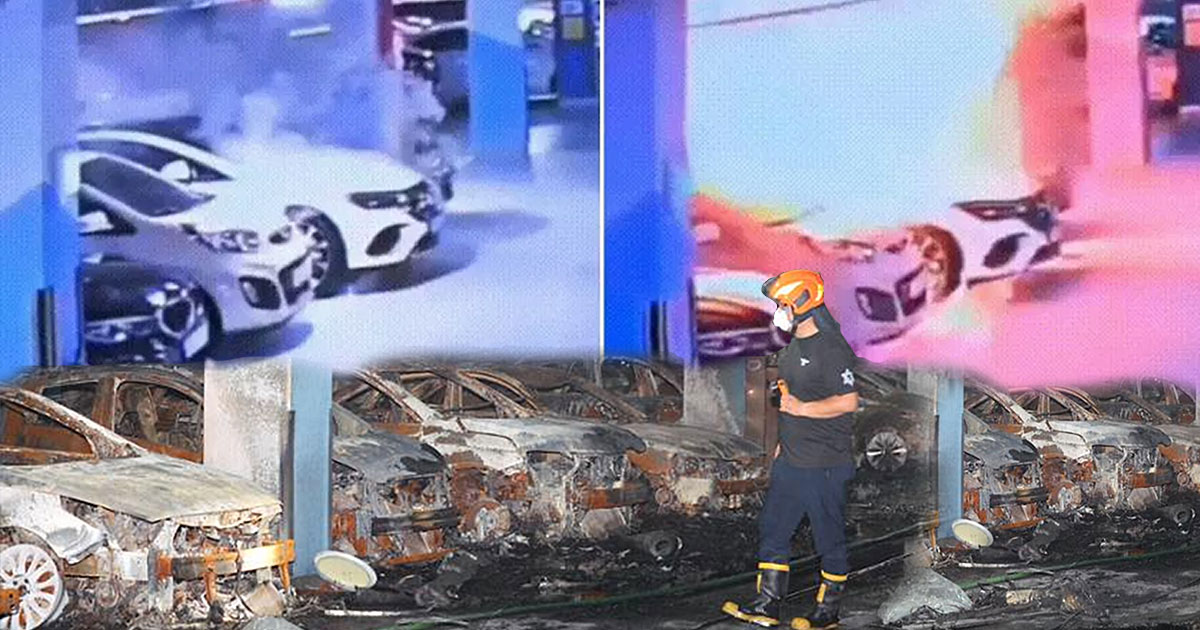New Safety Concerns as Mercedes EQE Catches Fire in Garage

The EQE was parked in an underground parking lot in Incheon, a city about 20 miles west of Seoul, when it began emitting white smoke and subsequently caught fire. This sudden blaze resulted in extensive damage to around 140 cars, with 70 vehicles suffering significant damage. The fire’s intensity led to the hospitalization of 23 residents from the apartment complex above due to smoke inhalation.
The immediate response involved the evacuation of 103 people from nearby buildings as black smoke filled the area. The fire’s aftermath extended beyond the parking lot, disrupting the electricity supply for the entire building complex and affecting nearly 500 households, which were left without power and water for five days.
Mercedes-Benz Korea’s Response
In the wake of the incident, Mercedes-Benz Korea issued a preliminary statement, acknowledging the severity of the situation but refraining from providing specific details about the model and batteries involved. The company emphasized its commitment to collaborating with fire authorities to determine the exact cause of the fire.
While the exact variant of the Mercedes EQE that caught fire remains unknown, there is speculation that it might be an AMG model. Importantly, the battery pack in the Korean EQE differs from those used in U.S. models. The Korean EQE’s battery cells were sourced from Farasis Energy, a Chinese supplier, under a deal signed with Mercedes’ parent company, Daimler, in 2018. In contrast, the U.S. EQE models utilize locally-made batteries from a joint venture with Envision AESC, which is produced near Mercedes’ factory in Alabama.
The Implications for EV Safety
This incident highlights the potential dangers associated with electric vehicle fires. While statistically less likely to catch fire than internal combustion engine vehicles, EV fires can be more challenging to control and can cause significant damage. The Mercedes EQE fire in Incheon is a stark reminder of these risks.
EV fires are often more intense due to the nature of lithium-ion batteries, which can release a large amount of energy when they catch fire. This can lead to rapid and uncontrollable flames, as seen in the Incheon incident. The damage to surrounding vehicles and the hospitalization of residents underscore the broader implications of such fires.
The Investigation Continues
As the investigation into the cause of the fire continues, authorities and Mercedes-Benz Korea are working to understand what went wrong. The focus is on the battery pack, with the possibility of a defect in the Farasis Energy cells being a primary concern. This could have significant implications for other vehicles using the same batteries.
The incident has also prompted a review of safety protocols for EVs, particularly in confined spaces like underground garages. Ensuring the safety of electric vehicles requires stringent safety standards and robust emergency response plans.
A Wake-Up Call for the EV Industry
The Mercedes EQE fire in Korea serves as a wake-up call for the entire EV industry. As electric vehicles become more prevalent, ensuring their safety becomes paramount. Manufacturers must rigorously test battery packs and other components to prevent such incidents. Additionally, the incident highlights the need for public awareness about the potential risks associated with EVs and the importance of proper maintenance and monitoring.
Moving Forward
For Mercedes-Benz, this incident presents a significant challenge. The company must address the immediate concerns raised by the fire while also reassuring customers about the safety of its vehicles. This involves transparent communication about the investigation’s findings and proactive measures to prevent future incidents.
For the broader automotive industry, the Incheon fire is a reminder of the importance of safety in the development and deployment of new technologies. As electric vehicles continue to evolve, ensuring their safety will be crucial to gaining and maintaining consumer trust.
Conclusion
The catastrophic fire involving a Mercedes EQE in South Korea highlights the potential risks associated with electric vehicles. While EVs are generally safe and less prone to fires than their internal combustion counterparts, the intensity of such fires when they do occur can lead to significant damage. The ongoing investigation will provide crucial insights into the cause of the fire and the steps needed to prevent similar incidents in the future. For now, the incident serves as a reminder of the importance of safety and vigilance in the rapidly evolving world of electric vehicles.
Homeowner Questions EV Safety After Fire Destroys Her Nocatee Home.
Jennifer Ruotolo is in the midst of packing up her life after a devastating incident involving a 2023 Mercedes-Benz EQE350+. The electric vehicle, which was a loaner from Mercedes-Benz while her personal car was being serviced, sparked a fire that destroyed her home in Nocatee. As she sifts through the remnants of her belongings, Jennifer questions the safety of electric vehicles, raising concerns about the risks they might pose. The fire not only razed her home but also left her grappling with the aftermath of a technology she once trusted. The incident has left her and her community seeking answers and reassurances about the safety protocols surrounding EVs.

